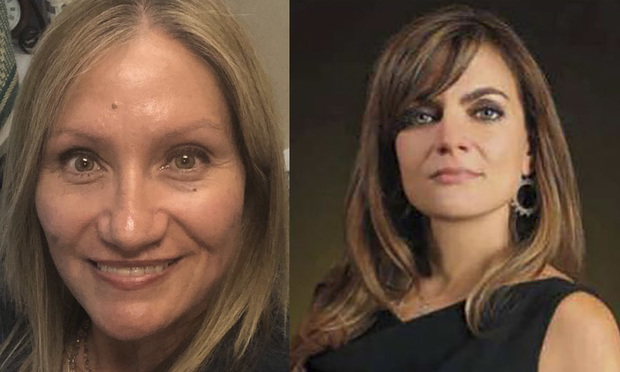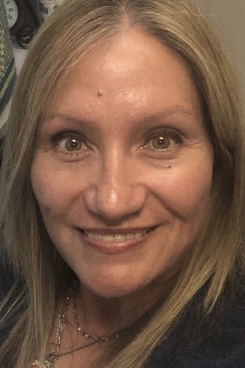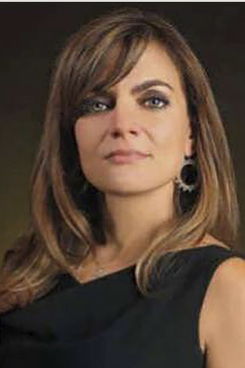Meet the Lawyers Campaigning for Judge of Texas' 383rd District Court: Democrats Lucila Flores and Lyda Ness Garcia
Seeking the Democratic party's nomination, candidates Lucila Flores and Lyda Ness Garcia are preparing for the runoff election in July.
June 26, 2020 at 10:00 AM
10 minute read
 Lucila Flores, and Lyda Ness Garcia. Courtesy photos
Lucila Flores, and Lyda Ness Garcia. Courtesy photos
Which candidate has the most family law experience is a campaign issue in the runoff for the 383rd District Court.
Seeking the Democratic party's nomination, candidates Lucila Flores and Lyda Ness Garcia are preparing for the runoff election in July. Whoever wins the runoff will compete in November against Republican candidate Phyllis Martinez Gonzalez.
Garcia points out that she's certified in child welfare law and serves on the Texas Supreme Court's Children's Commission.
"I am the only candidate who has exclusively focused my entire career on doing only the type of cases that this court will hear," Garcia wrote. "For over 20 years, I have been in the trenches with these very families this court serves, specializing in high-conflict complex family law cases."
But Flores points out that she's handled divorces, child custody cases, adoptions, child support cases, Child Protective Services and more. She also practices probate, landlord-tenant disputes and some civil matters.
"All of these experiences have combined to give me a varied tapestry of knowledge about the people in my community," Flores wrote. "It is the breadth of my experience that makes me different and better suited for the bench."
Texas Lawyer is publishing Q&As with the judicial candidates in runoffs. Early voting is June 29 to July 10, and election day is July 14.
Here are the Q&As for Flores and Garcia.
Read more: Texas Voters: Meet the Candidates Running for Judge in July Primary Runoffs
Lucila Flores
What is a brief biography of work experience, educational qualifications and career honors that you want voters to know about?
 Lucila Flores. Courtesy photo
Lucila Flores. Courtesy photo- December 1992, Bachelor of Arts, University of Texas at El Paso
- May 1998, Juris Doctor, St. Mary's University School of Law
- Licensed, November 1998
- Associate-Law Office of Norberto Flores
- Staff Attorney-Texas RioGrande Legal Aid
- Solo Practice-Law Office of Lucila Flores Camarena
- Assistant County Attorney, El Paso County Attorney's Office
- Trial Team Chief, Protective Order Unit, Trial Team Chief, Juvenile Unit, Principal Attorney, CPS Unit (El Paso County Attorney's Office)
- Attorney of the Year 2013 (El Paso County Attorney's Office)
Why do you want this position?
I want this position because of what I consider to be the unique nature of a family law judge. In my opinion this role requires not only a firm knowledge of the law but also the ability to be a problem-solver. I want to help the families of this county have their day in court in a respectful environment.
How are you different or better suited for the bench than your opponent?
What makes me different or better suited for the bench is the breadth of my experience. Over the last 21, almost 22 years, I have practiced in several areas of the law while also being involved in my community in various ways. All of this while engaging in my most rewarding endeavor: raising two sons.
I have had the privilege of not only practicing family law but also probate law, handling landlord tenant disputes and some civil lawsuits. Within the area of family law, I have represented people in divorces, custody matters, and adoptions. I've been appointed as an amicus in both family law cases and civil cases. I have experience representing both obligees and obligors in child support matters. I have extensive experience in the areas of protective orders and Child Protective Services cases. In Child Protective Services cases I have represented parents and been appointed attorney ad litem for children. I currently represent Child Protective Services.
Up until this pandemic hit, I had been out and involved in my community through presentations at schools and community organizations. Over the years I have presented to hundreds of school-age children ranging from sixth graders to seniors in high school about healthy relationships and dating violence. I have presented to schools and parent organizations about protective orders and living wills. I have volunteered at wills clinics. I have presented at senior citizens' centers on the topic of wills and living wills. I have trained numerous volunteers as well as school district police departments on protective orders. I have trained Court Appointed Special Advocates volunteers on Child Protective Services cases. I have participated in pro bono legal aid clinics.
All of these experiences have combined to give me a varied tapestry of knowledge about the people in my community. It is the breadth of my experience that makes me different and better suited for the bench.
How would you go about managing this court's docket efficiently and effectively?
Ensuring that the full work day is utilized.
Where can voters go for more information about you?
Lyda Ness Garcia
What is a brief biography of work experience, educational qualifications and career honors that you want voters to know about?
 Lyda Ness Garcia. Courtesy photo
Lyda Ness Garcia. Courtesy photoI received my Juris Doctorate from the University of Texas School of Law in 1997 and my undergraduate from the University of Michigan. I have been in solo practice for over 20 years with a focus on complex high-conflict family law cases and child welfare cases. I have litigated multiple jury trials.
I am one of the first attorneys in Texas to be licensed as a child welfare law specialist and remain one of a handful in El Paso. I currently serve on the Supreme Court of Texas Children's Commission as an advisory attorney. In addition, I am one of the founders, former vice president and current member of Child Welfare Defense Bar as well as the former vice president of the El Paso Family Bar. I am licensed in the District of Columbia and the commonwealth of Pennsylvania in addition to the state of Texas. I have been an expert presenter, writer and speaker in family law for continuing legal education conferences.
I have successfully litigated complex international cases involving child abduction affected by Hague Convention rules, conducted extensive research and worked with the FBI, international kidnapping agencies, and Spanish and Mexican consulates. In addition I represent Jane Does in parental bypass cases, including the appellate process.
Prior to being in private practice I worked as an assistant county attorney under the now-Sen. Jose Rodriguez and represented State of Texas Department of Protective and Regulatory Services in hearings for child abuse and neglect cases. I also represented applicants in protective orders and the state in juvenile proceedings. In that capacity, I contributed to committees advocating for children's rights and focused on improving judicial and social policies.
During law school I was a law clerk for the Travis County District Attorney's Office in Austin, working under the supervision of assistant district attorneys representing the state of Texas in child abuse cases where the state sought termination of parental rights. I also clerked as a student attorney at the Public Defender's Office of Travis County providing representation for juveniles in criminal trials, working under the supervision of the public defender. In addition, I was a student attorney ad litem for the Children's Rights Clinic at UT Law representing children under the supervision of a professor in cases in which the state sought custody or termination of parental rights. During this time I also volunteered at the Women's Advocacy Project in Austin advocating for efforts to support women in need through compilation of a database with legal procedures and resources available to victims of domestic violence.
I have organized multiple rallies and marches on progressive and social issues affecting our community to include women's rights, immigration rights, gun reform and LGBTQI rights.
My other community involvement, advocacy and accomplishments:
- Planned Parenthood Texas Votes Board (2019)
- El Paso Planned Parenthood Community Board Member (2018 – present)
- Co-founder of Women's March of El Paso (2018)
- Co-founder, Stand with El Paso Women (2013-present)
- Chair of El Paso For Equality (2010)
- State Democratic Executive Committee Woman for District 29 (2016-2018)
- Board of Trustee/ Public Relations Committee, Emergence Network (2011-2012)
- Board of Directors Delegate for Emergency Network for Texas Council of Community Center. (2011-2012)
- Board Member for Rio Grande Adelante (nonprofit committed to educating/empowering the LGBTQIA community) (2011-2012)
- Recipient, Marion Boner Scholarship for Public Interest Work, Travis County Women's Lawyers Association (1996)
Why do you want this position?
For 20 years I have spent my career advocating in and outside the courtroom for families. Every step I have taken on my path over the last 30 years has been dedicated to making life better for those who do not have the voice or hold power themselves. This is the natural culmination of serving the families in our community.
How are you different or better suited for the bench than your opponent?
As the only candidate who is a certified child welfare law specialist and serves on the Supreme Court of Texas Children's Commission, I have a unique legal experience needed to help children and families navigate difficult custody cases. This is a family law court, and I am the only candidate who has exclusively focused my entire career on doing only the type of cases that this court will hear. For over twenty years, I have been in the trenches with these very families this court serves, specializing in high-conflict complex family law cases.
As a child advocate, I have demonstrated my commitment in and out of the courtroom, to giving a voice to those who are often powerless. I will continue that philosophy in serving the families of the community from the bench. I believe I have the empathy, experience and knowledge of the law which is essential to successfully reducing the backlog, while ensuring a fair and just process for families.
How would you go about managing this court's docket efficiently and effectively?
I would establish a deadline for each stage of the case. For each deadline established, each case should be monitored by the number of days between events. Reports should be generated to identify those cases that are not meeting the time requirements. If a case is not meeting those constraint I would analyze where the delay is occurring and why. This is something that should be continually tweaked and evaluated. In addition, I would incorporate a process of input from the local family bar, establish a liaison with them and have those recommendations incorporated into my court policy.
Where can voters go for more information about you?
- Website: NessGarcia4Judge.com
- Resume
This content has been archived. It is available through our partners, LexisNexis® and Bloomberg Law.
To view this content, please continue to their sites.
Not a Lexis Subscriber?
Subscribe Now
Not a Bloomberg Law Subscriber?
Subscribe Now
NOT FOR REPRINT
© 2025 ALM Global, LLC, All Rights Reserved. Request academic re-use from www.copyright.com. All other uses, submit a request to [email protected]. For more information visit Asset & Logo Licensing.
You Might Like
View All
Houston Trial Lawyer Mary-Olga Lovett Leaves King & Spalding to Open Boutique
3 minute read

Deal Watch: Private Equity Dealmakers Make 2025 Predictions Amid Deal Resurgence
12 minute read
Trending Stories
- 1Snapshot Judgement: The Case Against Illustrated Indictments
- 2Texas Supreme Court Grapples Over Fifth Circuit Question on State Usury Law
- 3Exploring the Opportunities and Risks for Generative AI and Corporate Databases: An Introduction
- 4Farella Elevates First Female Firmwide Managing Partners
- 5Family Court 2024 Roundup: Part I
Who Got The Work
J. Brugh Lower of Gibbons has entered an appearance for industrial equipment supplier Devco Corporation in a pending trademark infringement lawsuit. The suit, accusing the defendant of selling knock-off Graco products, was filed Dec. 18 in New Jersey District Court by Rivkin Radler on behalf of Graco Inc. and Graco Minnesota. The case, assigned to U.S. District Judge Zahid N. Quraishi, is 3:24-cv-11294, Graco Inc. et al v. Devco Corporation.
Who Got The Work
Rebecca Maller-Stein and Kent A. Yalowitz of Arnold & Porter Kaye Scholer have entered their appearances for Hanaco Venture Capital and its executives, Lior Prosor and David Frankel, in a pending securities lawsuit. The action, filed on Dec. 24 in New York Southern District Court by Zell, Aron & Co. on behalf of Goldeneye Advisors, accuses the defendants of negligently and fraudulently managing the plaintiff's $1 million investment. The case, assigned to U.S. District Judge Vernon S. Broderick, is 1:24-cv-09918, Goldeneye Advisors, LLC v. Hanaco Venture Capital, Ltd. et al.
Who Got The Work
Attorneys from A&O Shearman has stepped in as defense counsel for Toronto-Dominion Bank and other defendants in a pending securities class action. The suit, filed Dec. 11 in New York Southern District Court by Bleichmar Fonti & Auld, accuses the defendants of concealing the bank's 'pervasive' deficiencies in regards to its compliance with the Bank Secrecy Act and the quality of its anti-money laundering controls. The case, assigned to U.S. District Judge Arun Subramanian, is 1:24-cv-09445, Gonzalez v. The Toronto-Dominion Bank et al.
Who Got The Work
Crown Castle International, a Pennsylvania company providing shared communications infrastructure, has turned to Luke D. Wolf of Gordon Rees Scully Mansukhani to fend off a pending breach-of-contract lawsuit. The court action, filed Nov. 25 in Michigan Eastern District Court by Hooper Hathaway PC on behalf of The Town Residences LLC, accuses Crown Castle of failing to transfer approximately $30,000 in utility payments from T-Mobile in breach of a roof-top lease and assignment agreement. The case, assigned to U.S. District Judge Susan K. Declercq, is 2:24-cv-13131, The Town Residences LLC v. T-Mobile US, Inc. et al.
Who Got The Work
Wilfred P. Coronato and Daniel M. Schwartz of McCarter & English have stepped in as defense counsel to Electrolux Home Products Inc. in a pending product liability lawsuit. The court action, filed Nov. 26 in New York Eastern District Court by Poulos Lopiccolo PC and Nagel Rice LLP on behalf of David Stern, alleges that the defendant's refrigerators’ drawers and shelving repeatedly break and fall apart within months after purchase. The case, assigned to U.S. District Judge Joan M. Azrack, is 2:24-cv-08204, Stern v. Electrolux Home Products, Inc.
Featured Firms
Law Offices of Gary Martin Hays & Associates, P.C.
(470) 294-1674
Law Offices of Mark E. Salomone
(857) 444-6468
Smith & Hassler
(713) 739-1250






